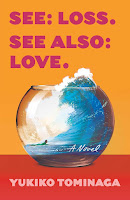Book Review: See: Loss. See Also: Love. by Yukiko Tominaga

Rating: 4.5⭐️
See: Loss. See Also: Love. by Yukiko Tominaga revolves around Kyoko, a young Japanese American immigrant in her late twenties, who loses her Jewish-American husband to a freak accident while she is visiting her family in Japan with her eighteen-month-old son, Alex.
The narrative is shared in four sections comprising a series of non-linear vignettes from the first person PoV of Kyoko as we follow her upbringing in Japan, her years as a student in the United States, her marriage to Levi and her settling in the United States to how she juggles her professional aspirations, her responsibilities as a single mother and her personal life in the years following Levi’s demise. Kyoko decides to remain in San Francisco with her son. Her parents in Japan are supportive of her decision and Levi’s family, especially his mother Bubbe, extend their support whenever needed. As we follow Kyoko over the years we see her reflect on her marriage and her loss – it is not just sorrow that she feels – her thoughts often turn dark, her grief often manifesting into anger as she embarks on a journey of catharsis and healing.
“But where are my tears when I think about my husband’s funeral? If I could, I would dig him up from his grave and stab his heart. I would stab his heart until it’s minced. I would break all his bones to make him like a puppet. I would crush him into a ball and kick him back into his coffin. I would throw rocks at him, tree branches, the shovel that I dug him up with, and all the gifts he gave me. Then I would ask him, ‘Why did you have to love me?’”
The author’s strength lies in her depiction of complex human emotions. What I found particularly striking about this novel was the honesty and insight with which the author has explored themes of grief and healing, infusing a healthy dose of humor into the narrative to keep it from becoming too bleak or overwhelming. Kyoto is critical of herself in all aspects of her life, more so as a single mother and even in her happier moments, she often experiences self-doubt. I loved how the author addresses cultural differences - it was both heartwarming and entertaining to follow how Kyoko approaches her relationships on both sides of the family as she strives to strike a balance between her Japanese roots and her life in the United States, especially in the context of Alex’s upbringing. At times she does come across as detached and unfeeling, a facet of her personality that is emphasized most when she reflects on her marriage and during her interactions with Bubbe, who sees her and accepts her as she is with warmth and affection. Kyoko, who is a tad reserved and not quite expressive when it comes to sharing her feelings or accepting help, finds it difficult to respond to Bubbe’s openness and effusive gestures. Bubbe is a loveable character and the author has done a remarkable job of depiction of how the dynamic between these two vastly different women evolves. Despite the non-linearity (which results in a slightly disjointed narrative), this is a well-rounded story. Beautifully written and thought-provoking, this is a novel I would definitely recommend to those who enjoy character-driven fiction that revolves around themes of grief, healing, family and motherhood.
Many thanks to Scribner for the digital review copy via NetGalley. All opinions expressed in this review are my own.
Comments
Post a Comment